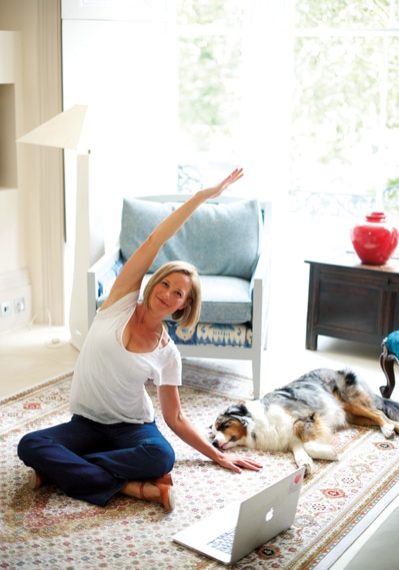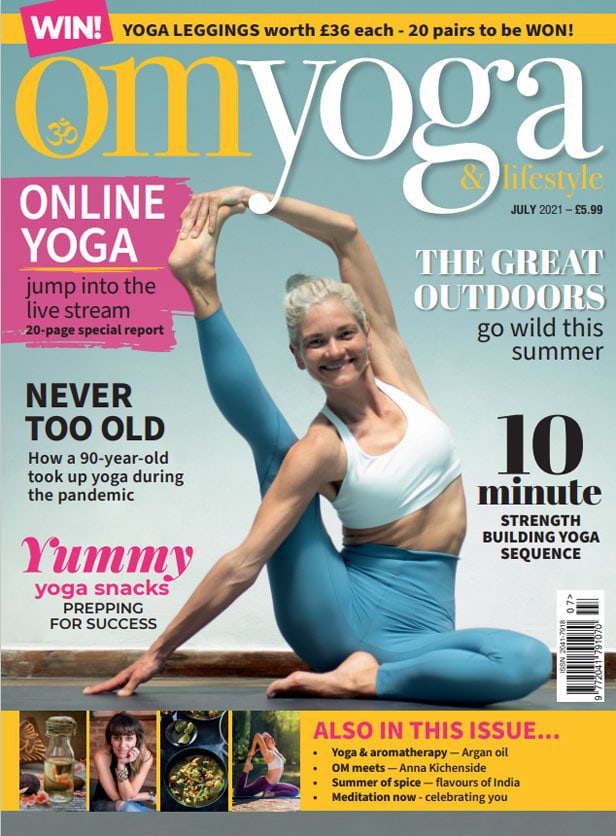
Join the movement
Kat Farrants, founder of Movement for Modern Life, says her passions are sustainability, accessibility and taking yoga off the mat and into real life
How did you first get into yoga?
I first started to practice yoga when I was 18. Even though, in my younger days, I had a very dynamic Ashtanga practice, the philosophical side of yoga has always interested me. The focus on non-violence, and living a life of connection, where nobody and nothing is separate; I’ve been a vegetarian since I was a teenager, so it all made sense to me!
It wasn’t until decades later, though, when I was involved in a nasty car crash that I discovered how useful the gentle movements of yoga were; the philosophy of yoga and acceptance really made all the difference to my healing. After that, my husband of 16 years left me. Yoga really helped my emotional healing, and without it, I’m really not sure how I’d have got through those very, very tough years.
What inspired you to start MFML?
Yoga nidra led me to uncover my dharma, of starting Movement for Modern Life. I knew that I had to share the practices which had helped my physical healing after the car crash, and my emotional healing after the divorce.
I didn’t like how so many of the teachers who were online were the ones who were great at marketing, looking perfect in front of a camera. For me, the very best teachers are just quietly doing and teaching their practice. I wanted to champion these teachers, the real teachers, the ones who lived and breathed their yoga — not the famous ‘yoga rockstars’ but the really great teachers, the ones who changed my life and transform real peoples lives.
I set up an online studio because accessibility and inclusivity was central to my vision. I wanted to make yoga, with the very best teachers, to be as accessible as possible, to people from all backgrounds, all incomes, everywhere in the world. I also loved that people who didn’t feel welcome in studios, who felt they didn’t fit the yoga body stereotype, would be able to practice in the comfort of their own home.
I love so many aspects of home practice. I love the fact that we can just get on and do it anytime — no airs and graces, we don’t need all that fancy yoga gear, just practicing in our PJs is perfect. I love that I can fit in a home practice for just 10 minutes every day. I love the freedom of taking our practice on the go, wherever we are, and I really love practicing outdoors.
Most of all, I love that, at home, we can practice exactly what we need to practice on that day, at that time — not the practice that the teacher fancies teaching, or is convenient to us. If we’re on our period, we can find a practice to ease the pain. If we’re working towards a particular physical pose, we can do that in class. If we only have 10 minutes, we can do a practice for 10 minutes.
If it’s bedtime, we can do something really calming, soothing, to prepare for bed.
My favourite practice is the evening practice, fireside, restorative or yin yoga and then just fall straight into bed. That’s heavenly.
What is the main ethos behind MFML?
MFML is a brand with an ethos, it's not just solely focused on commercial endeavours. My question is, why aren't more companies, particularly those involved in holistic and wellbeing spaces, being more vocal, more engaged with societal and ethical issues? Most companies are about making money. Our culture doesn’t reward long-term goals; it doesn’t value self-sufficiency, organic, slow growth and finding sustainable solutions. MFML is a Movement, a Revolution for our own personal wellbeing and for diversity in everything we do; that’s just how we were born and that’s integral to how we are run. With diversity and sustainability right at the heart of what we do, and with how we live off the mat as way more important than the shapes we might make.
I’ve just been questioning things from our very beginning back in 2013. I don’t ever want to do things which would unquestionably make us more money, like selling courses of ‘yoga for weight loss’ or having images of young, white, skinny, conventionally attractive people doing handstands on the beach. That’s how most of the bigger yoga brands have grown. I find the narrative around yoga in the West to be pretty toxic. Yoga brands mostly grow from subconscious messages to people that ‘you’re not enough’, so you need to buy our product. Advertising like that works on our insecurities and fears, and it works. But I want to always raise people up, and the main message of MFML is self-acceptance and compassion, and living a happier, healthier and more sustainable life.
Kat Farrants is founder of Movement for Modern Life (movementformodernlife.com)





